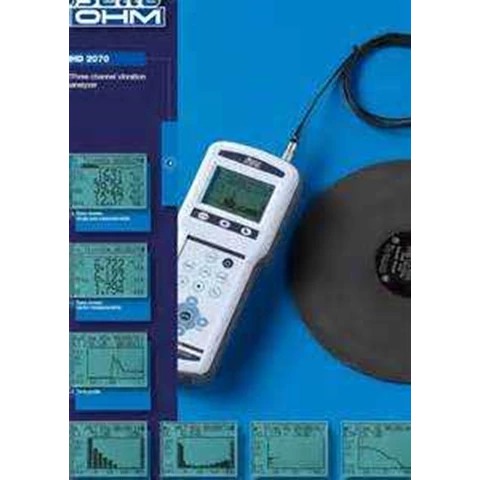Detail Delta Ohm HD 2070 Vibration Analyzer Hand Arm And Wole Body
Vibration Analyzer HWB HD 2070 merek Delta ohm
Main Feature:
• Octave and third octave filters, available as option ( HD2070.O1) , satisfy
class 1 specifications of IEC 61260 standard.
• The HD2070 detects accelerations on three axes with integrated amplifying
electronics ( IEPE or equivalent type) ; it is possible to connect three singleaxes
or one tri-axial accelerometer to the instrument. Accelerometers with
integrate electronics allow to achieve low impedance and low noise connections
between the accelerometer and the instrument, decreasing the probability
to get wrong or altered measurements because of interferences or
electromagnetic disturbances.
• The HD2070 analyzes the signals coming from the accelerometer and makes
calculations simultaneously on three axes; it calculates the weighted acceleration
values as well as the octave or third octave spectra ( with option
HD2070.O1) . Acceleration, velocity or displacement values can be shown
for each frequency band. Frequency weightings can be freely chosen according
to the specific application.
• Together with values of instantaneous and mean acceleration, the analyzer
calculates in addition peak levels, vibration dose ( VDV) , crest factors and
performs statistical analysis ( option HD2070.O2) .
• As statistical analyzer, the HD2070 calculates, with option HD2070.O2, the
probability distribution of a measurement parameter in 1dB classes. Both
the probability distribution and the percentile levels from L1 to L99 are available
as graphs.
• A versatile data logging function stores multiple profiles and spectra using
either the internal memory of 8MB or memory card ( MMC or SD cards up to
2GB) . Each record can be documented with a voice comment. In addition,
the HD2070 can be used as an audio recorder, as a further opportunity to
document the measures.
• With the option HD2070.O3 you can add to the profiles also the signals
provided by accelerometers, recording the digital samples directly. When the
stored data are analyzed, it is useful to examine the accelerometer signals to
verify the absence of artefacts such as, for example, those associated with
the phenomenon of DC-shift.
• The “ Navigator” program available in the analyzer allows to examine logged
measurements and to hear vocal comments.
• For a quick setup of the instrument it is possible to store up to nine setup,
user-customized according to specific applications. The desired setup is
easily identified by the associated title.
• The calibration can be performed using either the calibration data of the accelerometers
with a vibration generator. The last 120 calibrations performed
are recorded in a file and stored in a protected and reserved area of the
permanent memory of the instrument. The program interface Noise Studio
automatically adds the file supplied with the calibration measurements during
the downloading of data into the PC memory.
• HD2070 can be completely controlled by a PC, via RS232 and USB serial
interfaces, using a special communication protocol.
Applications
The HD2070 analyzer is able to perform all the measures required by the European
regulations 2002/ 44/ EC concerning workers protection from mechanical
vibration at the work place. The choice of hand-arm measurements ( HA)
or whole body ( WB and BV) changes the frequency range of the spectral
analysis available with the option HD2070.O1. For hand-arm measures the
range extends from 3.15Hz up to 3.15kHz ( from 4Hz to 2kHz for octave band
spectrum) , while for whole body measures the range of central frequencies
is shifted towards low frequencies, from 0.5Hz up to 315Hz ( from 0.5Hz to
250Hz for octave band spectrum) .
The HD2070 is suitable for the evaluation of worker exposure to vibration and
the risk of injury in the following cases:
• vibrations transmitted to the hand-arm system by vibrating tools or objects
subject to vibration or impact,
• whole-body vibration transmitted through the driver’ s seat of vehicles,
• whole-body vibration in workstations,
• Whole-body vibration of buildings subject to vibration or impact.
Technical specifications
Technical standards
• ISO 8041: 2005
• ISO 5349-1: 2001 ( hand-arm transmitted vibrations)
• ISO 2631-1, 2, 4 and 5 1997 ( whole body vibration)
• IEC 61260 : 1995 class 1 ( option HD2070.O1)
Measurement mode:
• HA: Vibrations transmitted to the hand-arm system
• WB: Vibrations transmitted to the whole body
• BV: Vibrations in buildings.
Storage
Internal 8MB FLASH type memory card and connector for type MMC or SD
cards up to 2GB
Interface
Serial type RS232 and USB
Input/ Output
LINE type output for each channel: 2Vpp f.s.
TRGIN input electrically isolated: used as trigger by external devices
TRGOUT output: 3V logic used as a trigger output for external devices
Power supply
Four AA 1.5V alkaline batteries with autonomy of 10 hours.
The instrument can use four rechargeable NiMH batteries. The instrument
does not act as a charger.
Environmental Parameters
Storage range: -25° C to 70° C, relative humidity less than 90% non-condensing.
Operating range: -10° C to 50° C, relative humidity below 90% without condensation.
Dimensions and weight
95mm x 240mm x 50mm, weight 680g








